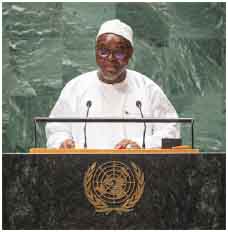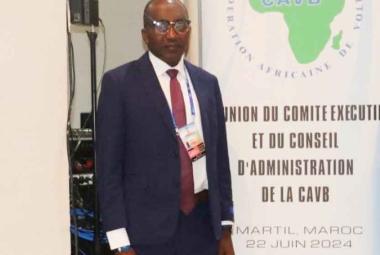In his address at the high level summit of the UN General Assembly in USA last week, Vice President Mohammed BS Jallow told world leaders that “the world is facing numerous crises and a multiplicity of daunting challenges that raise serious questions about the readiness and viability of our multilateral institutions and arrangements, in the event of another crisis or pandemic”.
He called for major reforms and organisation of the institutions to make them fit for purpose.
He went on: “Our world is in dire need of rebuilding that lost trust, and our multilateral institutions must assist in regaining it by, first, reforming and retooling themselves. From underdevelopment to climate change, unsustainable debts to cost-of-living crises, and conflicts to marginalization, we need to cooperate better and share the burden of solutions equitably through greater partnerships and solidarity”.
The Vice President warned the story on global attainment of the Sustainable Development Goals (SDGs) is not very positive. “It is a story of unfulfilled commitments, weak international cooperation, and lack of genuine global solidarity. It is a story that is all too common when it gets to implementing global commitments”.
He therefore called concerted efforts and re-commitment to the attainment of the SDGs in the Global South. “If we remain on our current trajectory without effecting corrective action, the world’s most vulnerable peoples would be left behind much further we can ever fathom,” he warned. As LDCs, he we call for the steadfast implementation of the new Doha Program of Action so that it would not be another lost decade of unfulfilled commitments.
On debt burden,
VP said in view of the current harsh economic realities across the Global South, many developing countries are contending with unsustainable debt burdens that are compromising their ability to dig themselves out of poverty. “In the quest for post-pandemic recovery, debt servicing is severely shrinking our economies, especially in the Least Developed Countries”.
He therefore urged the international community to step up its efforts through new and existing initiatives towards finding durable solutions to the debt problem.
He went on: “The issue of debt relief for LDCs is linked to the necessity for greater reform of the international financial institutions (IFIs) and their decision-making mechanisms, particularly those relating to development finance and debt. We join other developing countries in calling for reforms that ensure our greater participation and a stronger voice in decision-making”.
On climate change Mr Jallow said Africa is paying a very heavy price for global warming, even though it is the least contributor to climate change. He referenced the “cataclysmic weather events” are currently impacting the world and that it is imperative and urgent to undertake collective action to tackle climate change for a more livable world.
“When shall we meet the $100 billion annual commitment to combat the phenomenon? Shall we ever agree on the modalities for the “Loss and Damage Fund” at COP28?” he queried.
“These are important questions to ask, considering the prevailing mistrust that continues to characterize the global dialogue on climate change and climate action. We have to act soonest and rebuild trust in our collective fight against global warming”.




